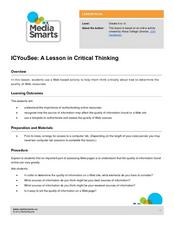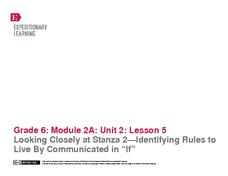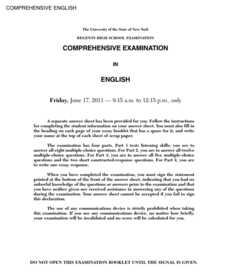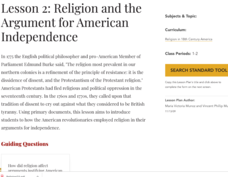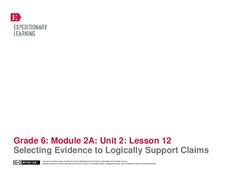Curated OER
ICYouSee: A Lesson in Critical Thinking
Stress the importance of authenticating online resources and understanding the sources of websites' information with this activity. Using a Web-based activity, the instructional activity prompts young learners to think critically about...
Houghton Mifflin Harcourt
American Stories: Extra Support Lessons (Theme 2)
Here's a packet designed especially for those kids who need extra support with the basic concepts in the Houghton Mifflin Harcourt thematic units on American stories.
Curated OER
ASL: Lesson 13
Ever consider becoming an interpreter for a special needs or hearing impaired pupil? ASL lesson 13 focuses on becoming an interpreter and also on research. Included are many links to visual aids and video intended to guide your signing...
EngageNY
Looking Closely at Stanza 2—Identifying Rules to Live By Communicated in “If”
Pupils take part in a close reading of the poem, If by Rudyard Kipling, in which they delve deep into its meaning and identify its rules to live by. As the grand discussion progresses, learners then relate the poem's rules with those...
C3 Teachers
Black Genius: How Did Black Genius Help Build American Democracy?
"How did the slavery system undermine the United States' democratic principles?" This question launches a study of how the Preamble to the Declaration of Independence, Article I, Section 2 of the U.S. Constitution, and Article IV,...
C3 Teachers
Reparations: Why Are Reparations Controversial?
To understand why the topic of reparations is controversial, young scholars gather background information by reading articles, watching videos, and examining cases where reparations were made. Learners consider the lasting repercussions...
Curated OER
Exploring Arizona's Biotic Communities Lesson 3: A Day in the Life
Junior ecologists examine Arizona's biotic communities and research an animal or plant that is found in this community. In this lesson, learnerss write a narrative essay about their assigned animal or plant. They research online and in...
EngageNY
Grade 11 ELA Module 4 Overview
The intricate craft of narrative writing can make a happy story feel exuberant or a sad story feel devastating. With 42 extensive lessons that include poignant discussion questions, standards-aligned self-reflections, engaging writing...
EngageNY
Looking Closely at Stanza 3—Identifying Rules to Live By Communicated in “If”
Just as Bud, from the novel Bud, Not Buddy by Christopher Paul Curtis, had rules to live by, so does the poem, If by Rudyard Kipling, but how do the two relate? Pupils delve deep into the poem's third stanza, participate in a grand...
Odell Education
Building Evidence-Based Arguments: “Doping can be that last 2 percent.”
Even the most thrilling sports career can end in an asterisk if the player uses performance-enhancing drugs. Focused on the topic of doping in sports, a seventh grade unit breaks down the arguments for and against steroids in five...
Houghton Mifflin Harcourt
Give It All You’ve Got!: Extra Support Lessons (Theme 2)
Understanding word parts can play a crucial role in understanding a word in the context of a larger text. A series of extra support resources designed to accompany Theme 2: Give It All You've Got offers activities related to grammar and...
Poetry4kids
Playing With Your Food Poem Lesson
What's more fun than playing with your food? Writing a poem about it! A quick and straightforward lesson guides young writers through the steps of writing a funny, well-structured poem about combining sports and food.
New York State Education Department
Comprehensive English Examination: June 2011
Get those pencils sharpened—it's time to see what the class knows! Using the resource, scholars complete a four-part English examination. They read passages and respond to multiple-choice comprehension questions. They also complete two...
National Endowment for the Humanities
Lesson 1: The First Great Awakening
High schoolers examine the First Great Awakening and how it affected religious belief in colonial America. They read and analyze primary source documents, explore various websites, and write a five-paragraph essay examining the beliefs...
National Endowment for the Humanities
Lesson 2: Religion and the Argument for American Independence
Young scholars examine how religion affected arguments justifying American independence. They read and analyze primary source documents, and write an essay analyzing how Americans used religious arguments to justify revolution against a...
Deliberating in a Democracy
Cyberbullying—Lesson Plan
Learners examine cyberbullying. In this lesson on democracy, students discuss the different ways to deal with cyberbullying. They then take a position on the question of whether a democracy should allow schools to take action against off...
EngageNY
Selecting Evidence to Logically Support Claims
It's time to make a rule sandwich! After exploring the writing assignment's rubric and analyzing a model essay, learners are guided through the prewriting phase using the sandwich technique. Pupils create their sandwich addressing the...
One Stop English
A Lesson on Register
The classroom might not be the best place for informal language, but it's a great place to teach middle and high schoolers how to identify the correct language register for their audience. A short lesson on formal and informal language...
EngageNY
Building Background Knowledge: The Dinka and Nuer Tribes
Building on a previous lesson plan, readers continue using context clues to learn new vocabulary. Additionally, they continue working on their Gathering Evidence graphic organizers, making connections between an informational text and A...
Core Knowledge Foundation
Unit 6: American Revolution
The American Revolution is the theme of a five-week unit that focuses on reading, grammar, morphology, and writing. Scholars read and respond to texts, practice spelling and word work, and write paragraphs. Assessments gauge comprehension.
Digital Public Library of America
Teaching Guide: Exploring Little Women
Louisa May Alcott's Little Women is a literary masterpiece as well as a timestamp of the formative mid-nineteenth century in America. Using a primary source set of photographs, letters, and portraits, readers discuss the ways...
Curated OER
5 Broken Cameras: How Storytellers Shape the Story
5 Broken Cameras, the award-winning documentary nominated for a 2013 Academy Award and winner of the Sundance 2012 Directors Award is the focus of a resource packet that includes a lesson plan, discussion guide, reading lists, background...
Curated OER
Brown Bear, Brown Bear, What Do You See?
Learners read the story Brown Bear, Brown Bear, What Do You See? and read companion poems, make a bear book, blend sounds, and more. For this guided reading lesson plan, students take 5 days to read the book.
Curated OER
Charlotte's Web
Fourth graders focus on fluency by reading the book Charlotte's Web. In this reading strategies instructional activity, 4th graders partner read, do guided reading, and independent reading to increase fluency. Students use Venn Diagrams,...
Other popular searches
- Guided Reading Lessons Plans
- Guided Reading Lessons 4 6
- Guided Reading Lessons K 2
- Free Guided Reading Lessons
- Guided Reading Lessons Frogs
- Guided Reading Lessons 3 6
- Ell Guided Reading Lessons


